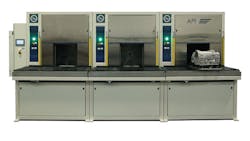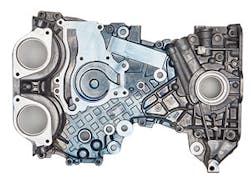The steady rise in the volume of aluminum castings being produced, in particular automotive engine and powertrain parts, has spurred a significant expansion in the variety of products and systems for sealing those parts, to address inherent porosity. While aluminum alloys offer automotive designers an option for producing lightweight parts in high volumes, aluminum castings often present porosity defects, small surface-level holes or cracks that can be permeated by fluids or gases. Porosities appear as castings change from a liquid to a solid state. They present a functional problem for engine blocks, cylinder heads, and compressors, and if not properly sealed they can lead to corrosion, pressure loss, fluid loss or even failures while in service.
Sealing the castings ensures they will not leak gas or fluid, and that they will provide appropriate resistance to chemicals, aggressive fluids and high operating temperatures in service. The process for doing sealing them is impregnation: castings are coated with a resin formulation, and frequently that resin is sealed to the casting under vacuum.
One development arising from the need for sealing is the introduction of new resins, like Stronghold Coating Systems’ Blue Dichtol, a modified impregnation coating compatible with all ferrous and nonferrous materials, and composites.
This capillary sealer impregnates micro-pores and hairline cracks without vacuum or pressure, forming a protective barrier to gases and liquids. It can be applied to raw metal, or to castings that have been coated with plasma, arc spray, or HVOF coatings.
Blue Dichtol penetrates to 0.004 in., restoring pressure tightness and enhancing surface and varnish properties. The engineered polymers penetrate up to 20 mm into the coating, preventing corrosion of the metal substrate. A blue tint provides positive visual proof that porosity has been sealed. Following air-curing of approximately 1 hour per mm of wall thickness, it provides resistance to chemicals, mechanical stress, and temperature extremes. The cured coating is pressure resistant to 8700 psi, and heat resistant to 932o. It also dampens vibration.
Industrial chemicals specialist Henkel offers a portfolio of resins and processes for sealing automotive parts, as well as a customized service through both external suppliers and customized, on-site impregnation service installations. Henkel’s Loctite Impregnation Solutions (LIS) package aims to provide automakers and their suppliers with “a one-of-a-kind, fully automated impregnation system,” and “high-tech resins” that provide consistent quality and sealing performance.
Henkel assures customers of very high sealing rates, “clean and dry parts ready for assembly. The LIS centers help foundries to minimize resin usage and energy costs and to shorten the processing time.”
Henkel has been offering impregnation services for over a decade, and has 17 on- or off-site centers worldwide, including Magna Tech Manufacturing (acquired late 2015.) There are 11 LIS locations offering vacuum impregnation service in North America.
The customized installations are a “highly flexible, independent” service certified to TS 16949 standards, and installed directly at a customer’s plant, reducing transport costs and cutting the customers’ investment in equipment and personnel to manage that process.
For plants adopting on-site vacuum impregnation capability, the most notable new technology is from Godfrey & Wing. The Advanced Powertrain Impregnation (APi) system was developed specifically for automotive powertrain manufacturers, the developer noted, but it also is applicable for light- to medium-weight, large-volume part impregnation.
Onsite systems are an increasingly common option for foundries and engine/powertrain plants,
Godfrey & Wing’s APi system uses the same, patented dry vacuum and pressure (DVP) process technology found in GW’s CFi and HVLV impregnation systems, but offers a 43% larger work envelope to accommodate new, larger transmission cases.
“In response to a need in the marketplace for a vacuum impregnation system with the capability to impregnate larger parts, our engineering team developed the APi,” Matt August, G&W’s director of Business Development. “Like the HVLV, the APi is modular in design and is available as either a manual or automated system. The manual system is capable of processing up to 15 cycles per hour, and the automated system can process up to 36 cycles per hour. The separate vessel, rinse and cure modules allow for flexible system configuration.”
The developer said APi “fills a void in the marketplace” and meets the emerging demand for single-piece flow impregnation of large parts.
About the Author
Robert Brooks
Content Director
Robert Brooks has been a business-to-business reporter, writer, editor, and columnist for more than 20 years, specializing in the primary metal and basic manufacturing industries. His work has covered a wide range of topics, including process technology, resource development, material selection, product design, workforce development, and industrial market strategies, among others.

